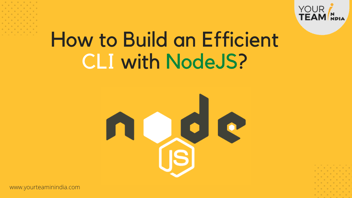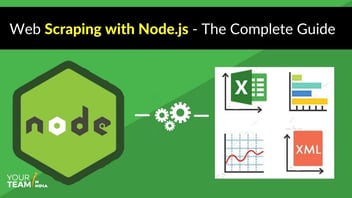Quick Summary: Dive into the ultimate showdown between Node.js and PHP in this epic battle of programming languages! Explore their strengths, weaknesses, and applications to determine which reigns supreme for your next development project.
Whether you choose Nodejs or Php; both programming languages are potent enough to handle web applications with maximum complexity. However, you have to choose one between the two. Making this decision creates confusion and urges entrepreneurs to make Nodejs vs Php comparison before developing a web app.
And why not? Web applications are the face of a company and helps to connect with the customers. So, to make their investment-worthy, companies want a robust and scalable backend, that will be easy to manage. As Php and Nodejs are both back-end programming languages, this comparison becomes more important.
It all started back in 2008 when Google launched V8 JavaScript Engine and JavaScript entered the backend development domain. Within a very small timespan, Node.js was all set to become the best JavaScript framework.
Simply put, the main difference between NodeJS vs PHP is that Node. JS is an open-source, cross-platform framework that uses JavaScript for full-stack development. In contrast, PHP is an open-source server-side script language.
Without wasting another single minute, let's begin the Nodejs vs Php comparison.
Nodejs vs Php
Node.js: Initially released in 2009, Node.js was developed by Ryan Dahl, having a javascript-based platform or framework for web-based applications. It is coded in C, C=++ and JavaScript.
PHP: Designed by Rasmus Lerdorf and launched in 1995, PHP, also known as hypertext preprocessor, is a server-side scripting language used for web development. It is also a general-purpose programming language, and its implementation includes Perl, C, C++, and Java.
| Feature | Node.js | PHP |
|---|---|---|
| Language | Node.js uses JavaScript, a versatile, lightweight scripting language. |
PHP (Hypertext Preprocessor) is a server-side scripting language designed for web development. |
| Runtime | Node.js runs on the V8 JavaScript engine, which compiles JavaScript code into machine code. |
PHP runs on the Zend Engine, a scripting engine that interprets PHP code and generates HTML for the browser. |
| Server-side | Node.js is primarily used for server-side programming, allowing developers to build scalable network applications using JavaScript. |
PHP is exclusively designed for server- side programming, enabling the creation of dynamic web pages and applications. |
| Event-driven | Node.js is event-driven and asynchronous, allowing it to handle multiple requests simultaneously |
PHP is not inherently event-driven. It follows a more traditional synchronous request-response model. |
| Asynchronous | Node.js is known for its non-blocking I/O operations, making it suitable for handling high-concurrency tasks. |
PHP is blocking by default, meaning it executes one operation at a time and waits for each operation to complete. |
| I/O operations | Node.js performs non-blocking I/O, allowing it to process multiple I/O operations concurrently. |
PHP performs blocking I/O operations, which can potentially lead to slower performance, especially in high- concurrency scenarios. |
| Concurrency | Node.js is single-threaded but handles concurrency using event loops and asynchronous programming. |
PHP traditionally follows a multi-threaded model, creating a new thread for each request, which can impact performance and scalability. |
| Performance | Node.js is known for its high performance due to its non-blocking I/O operations and event-driven architecture. |
PHP has moderate performance compared to Node.js, particularly in high-concurrency scenarios. |
| Ecosystem | Node.js has a vast ecosystem supported by npm (Node Package Manager), providing access to numerous packages and modules. |
PHP has a rich ecosystem of frameworks, libraries and tools, with established frameworks like Laravel, Symfony, and CodeIgniter, among others. |
| Frameworks | Node.js has popular frameworks like Express, Koa, and NestJS, enabling developers to build scalable and efficient applications. |
PHP offers a wide range of frameworks, including Laravel, Symfony, and CodeIgniter, which facilitate rapid development of web applications. |
| Scalability | Node.js is easily scalable, particularly for handling high-concurrency tasks. |
PHP scalability depends on the server configuration and architecture. |
| Real-time | Node.js is ideal for real-time applications such as chat apps, gaming servers, and streaming platforms due to its event-driven architecture and non-blocking I/O. |
While PHP can handle real-time applications, it may not be as efficient as Node.js due to its blocking nature and traditional request-response model. |
1. Development
The experience of a developer working with a PHP is quite fast and simple. There is no need to include converters and compilers. In fact, the language has a simple connection to the SQL database and hosting with zero limitations.
Whereas, Nodejs is somewhat complicated. The framework and application deployment is complicated little hand, so is the server infrastructure.
2. Hosting
Php is supported by plenty of hosting services and for this reason, the integration and deployment of Php are easy.
Node.js has less number of hosting that calls for a virtual server having SSH access for running applications.
3. Application Domain
Php gets preference over Node.js for app utilization as there is no frequent interaction between client and server-side.
Best applications scenario:
- App using LAMP stack in API
- Content Management System
- Creating a CPU-intensive app
Nodejs: It has the upper hand because the applications require constant client-server interactions.
Nodejs is used for:
- Developing single-page applications
- Development of a highly scalable server-side application
- Real-time application
4. Source Code
Php is in C. GitHub is the mirror of official Php git. It has 109,885 commits, 287 branches, 940 releases, and 580 contributors. All the issues and feature requests are a bit tougher to get. There are 444 bugs and who knows how many RFCs as there is no page summary.
Node.js is in C++. Github has 25,000 commits, 131 branches, 522 releases, and 2379 contributors of Node.js. Five hundred four open issues and 222 pull requests. All of them are tracked in one place-the public GitHub repo.
5. Synchronous and Asynchronous
Php: It follows the synchronous execution of codes. This backend language executes the code in sequence. It doesn’t matter how long it takes for execution, it will not move to the next if the previous is not completed.
Nodejs: Nodejs is asynchronous, so it doesn’t execute the codes in sequence. If one function consumes time to execute, it will send to the queue and move to the next. Thus, the user doesn’t wait until the precious code completion.
6. Performance
Php is used for the whole stack, including the compilation and rendering of the webpage.
Node.js serves API requests. It is a thin layer between the web client and the database.
7. Desktop Applications
Php serves web apps. Executes directly via CLI, does almost everything. Php developers can also use it to build basic desktop apps with PHP-GTK or PHP-Desktop.
Node.js has come a long way in terms of applications. It serves web requests using Express. Also known for communicating over sockets. But today, it builds web apps with tools like gulp, grunt, or webpack. The build engines are responsible for compiling and optimizing front-end code in multiple applications. Also, desktop apps like Skype, Visual Studio Code, and Slack are built from Node.js.
Recommended Read: How to Hire Php Developers in India?
9. Framework
Php: Laravel, Codeigniter, Symphony, CakePHP, FUelPHP, Phalcon and there are so many other frameworks for Php.
The above-mentioned frameworks have their domain in the web industry. Every framework has the niche of its own. Hire mobile app developers who expertise in a particular niche.
Nodejs: There are growing frameworks with the upcoming community. You may not have many options and variety as PHP, some popular ones are-Express, Meteor.js, DerbyJS and Sails.js
9. Extensibility
You may want to extend technologies to fit the circumstances. The developers can fork the source code, modify it and compile to extend. There are also add-ons and package managers for both the platforms.
Php:
- Php takes help of module installing technology like PEAR & Composer
- PEAR: The framework or distributed system for reusing Php components
- Composer: Tool for dependency management in PHP that allows the developer to declare and manage the project dependent libraries.
- Php doesn’t come with module bundles, you have to download and install manually.
Node.js:
Node.js has rich package registry at npmjs.com with the help of strong community contribution. Although there are Node.js package registries, none are in the forefront as of now. Although there are a few resources about contenders on node-modules.io. Node.js is pre-pack with NPM package management system and registry. The easy to use and publish modules are related to Php.
In terms of extensibility, there is a tie. Developers can code in C & C++, and that can be extended. If you don’t want to get into matters of trust, you can also find pre-packaged versions.
10. Databases
Php: It interacts with traditional/relational database. This is why it works well with MYSQL, PostgreSQL, and MariaDB. Although, NoSQL usage can take place but it is not frequent.
Node.js: It is good for NoSQL databases like MongoDB and CouchDB and also graph database system like Neo4j with JSON. SQL data.
11. WebServer Setup
Php versions prior to v5.4 required downloading and setting up LAMP and XAMPP servers. Php comes bundles with the inbuilt development server.
Node.js comes prepacked with modules like file system HTTP and DNS. This helps Node.js developers to create customized web servers. Express, Koa.js, and Sails.js are popular Node.js frameworks that empower Node.js running web server.
11. Development Stacks
Php: Back end code in Php when created, the developer keeps switching between different programming languages. This is when PHP is a LAMP part (Linux, Apache HTTP Server, MySQL, and PHP) stack.
Nodejs: Uses MEAN (MongoDB, Express.js, AngularJS and Node.js) or MERN (MongoDB, Express.js, React and Node.js) stack. The programming language used for the entire stack is JavaScript.
Personal Final Viewpoint
There is one thing that always fascinates everyone and that s ‘change.’ Entrepreneurs should always stay updated with the latest technology based on the market requirement.
Php is one of the top languages in this digital era. On the other hand, Node.js is technically a runtime environment for JavaScript. It is champion of a younger web development generation and suited for creating event-based, data-driven, I/O heavy applications that you encounter in this 2.0 era.
Undoubtedly, the asynchronous and event-based architecture of Node.js is ideal for real-time applications like collaborative apps and messaging apps where a lot of requests takes place. Node.js has its own CMS called Keystone.js.
As far as the future is concerned, Node.js is best to choose but community support still makes Php the ultimate winner because it has the edge. Additionally, developers have to make a good choice between both the platforms because the ultimate end product matters the most.






